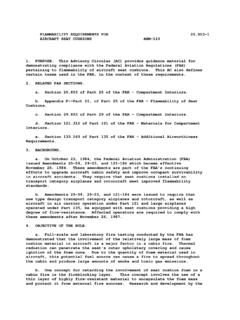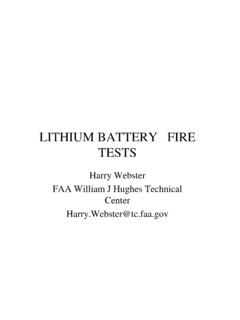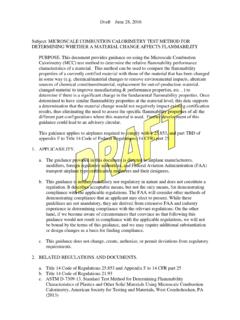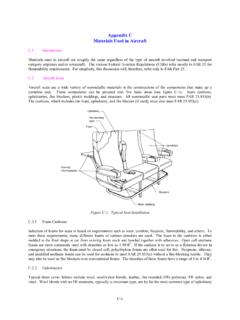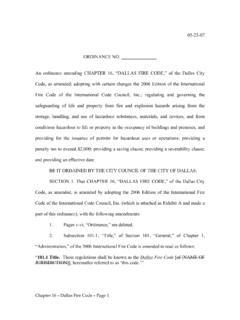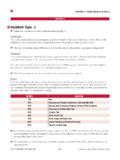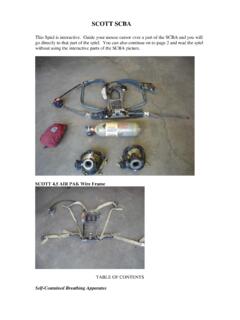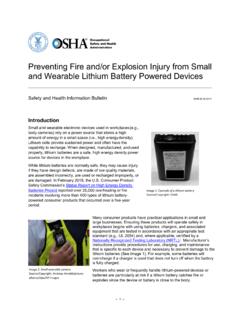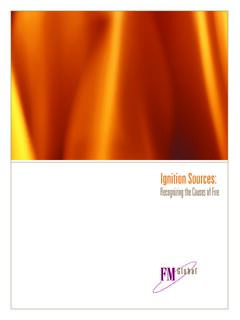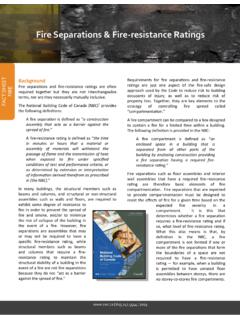Transcription of Fire Hazards of Lithium Ion Batteries
1 fire Hazards of Lithium Ion Batteries FEDERAL AVIATION ADMINISTRATION Aviation Research Division William J. Hughes Technical Center Atlantic City International Airport, NJ 08405 *Department of fire Protection Engineering, University of Maryland, College Park International Aircraft Systems fire Protection Working Group Meeting Dresden, Germany, May 12-13, 2015 WEB: E-MAIL: Richard E. Lyon, Richard N. Walters, Sean Crowley, and *James G. Quintiere Objective: Measure fire Hazards of LIBs Passenger electronics Typical packaging Typical bulk shipment as cargo Causes of Battery Failure Thermal Separator melts due to high temperature causing internal short circuit that releases heat.
2 Contents mix, react and thermally decompose. Electrical Overcharge Rapid discharge Mechanical Physical damage (puncture) Manufacturing defect or contaminant All lead to auto-accelerating heat generation and rapid temperature increase (Thermal Runaway) leading to fire and/or explosion < 1 second Materials: Commercial 18650 LIB Cells 65 mm 18650 Rechargeable Cells ( 44 grams each) 18 mm Electrical Properties of Tested Cells LiMn2O4-LiNiCoO2 LiCoO2 LiNiCoAlO2 Unknown Cathode Maximum Capacity,Qmax (A-s) 11,700 9,400 5,400 18,000 Rated 11,200 8,300 5,000 3,600 Actual Cell Potential, (V) - G, Qmax (kJ/cell) 41 31 19 13 Nominal Max.
3 State-of-Charge, SOC = Q/Qmax Chemical Energy Available to Do Useful Work (Free Energy), G = - Q Experimental Methods: Cell Charging Charge / Discharge 4 cells simultaneously Record: charge / discharge capacity Programmable for different states of charge Methods: Hazard Measurements Thermal Effects of Cell Failure Purpose-Built Thermal Capacitance (Slug) Calorimeter Energetics of Cell Failure ASTM D 5865-14, Standard Test Method for Gross Calorific Value of Coal and Coke fire Behavior of Lithium Cells (ASTM E 1354, Standard Test Method for Heat and Visible Smoke Release Rates for Materials and Products Using an Oxygen Consumption Calorimeter) Bomb Calorimeter (ASTM D 5865) Parr Instruments Model 1341 Plain Jacket Oxygen Bomb Calorimeter Resistance heating to force thermal runaway of LIBs Nitrogen blanket (1 Atm)
4 To prevent oxidation of contents after failure Temperature, voltage and current logged for all tests Bomb and other components for 18650 battery tests Experimental Setup Thermodynamics of Cell Failure Energy released by mixing, chemical reaction and thermal decomposition of cell components. UTotal Urxn QTotal energy released at cell failure (measured in bomb) Electrochemical (Free) energy release (Calculable from cell potential (V) and charge Q (A-s)) Depends on cell chemistry Analysis of Bomb Calorimeter Data 0 10 20 30 40 50 60 70 80 0 500 1000 1500 2000 2500 3000 3500 Energy Release at Failure (kJ/cell) Charge, Q (mAh) Free Energy, G ( Q) Total Energy ( Utotal) Energy of Mixing, Reaction and Decomposition, Urxn Urxn 90% of Q LiMn2O4-LiNiCoO2 LiCoO2 LiNiCoAlO2 Unknown 18650 Cell Chemistry 80 70 60 50 40 30 20 10 0 0 10 20 30 40 50 60 LiMn2O4-LiNiCoO2 Energy Release at Failure (kJ/cell)
5 60 50 40 30 20 10 0 -10 0 5 10 15 20 25 30 35 40 LiCoO2 40 30 20 10 0 -10 0 5 10 15 20 25 LiNiCoAlO2 Electrochemical Free Energy, Q (kJ/cell) 30 25 20 15 10 5 0 -5 0 5 10 15 20 Unknown Utotal Urxn Energetics of Individual Cell Failure Utotal Urxn Utotal Urxn Utotal Urxn Free Energy, Q (kJ/cell) State of Charge, Q/Qmax (%) LiMn2O4- LiNiCoO2 LiCoO2 LiNiCoAlO2 Unknown 0 10 20 30 40 50 60 70 80 0 20 40 60 80 100 0 10 20 30 40 50 0 20 40 60 80 100 State of Charge, Q/Qmax (%) Stored Electrochemical Energy ( Q) Total Energy ( Utotal) LiMn2O4- LiNiCoO2 LiCoO2 LiNiCoAlO2 Unknown Total Energy, Utotal (kJ/cell) State-of-Charge is Not a Good Predictor of Energetics for Different Chemistries and Cell Potentials Li-Ion 18650 Batteries - Post Test Zero Charge 50% Charged 100% Charged Gravimetric Analysis for Volatile Yield 0 1 2 3 4 5 6 0 10 20 30 40 50 Volatile Yield, g/cell Electrochemical (Free) Energy, Q (kJ/cell)
6 Bomb weighed before and after venting to atmosphere to determine volatile yield Volatiles are combustible Yield Q LiMn2O4-LiNiCoO2 LiCoO2 LiNiCoAlO2 Unknown Infrared Spectra of Gaseous Decomposition Products LiMn2O4- LiNiCoO2 LiCoO2 LiNiCoAlO2 Unknown Thermal Effects of Cell Failure Quintiere & Crowley, Thermal Dynamics of 18650 Li-ion Batteries , The Seventh Triennial International fire & Cabin Safety Research Conference, Philadelphia, PA, 2013. 20 g 2 s 600 C 2 s Separator Melts (150 C) Venting (200 C) Failure (250 C) 0 10 20 30 40 50 0 10 20 30 40 50 Thermal Energy qb, kJ/cell Stored Free Energy, Q (kJ/cell) 1 1 Thermal Energy Release (qb) Free Energy ( Q) Implies chemical reactions of electrolytes ( Urxn) take place outside of cell when contents are ejected 0 200 400 600 800 1000 1200 1400 0 20 40 60 80 100 Maximum Cell Surface Temperature, Tmax ( C) State of Charge/SOC (%) Tmax Tf Utotalmcp Tf Urxnmcp QmcpContents Ejected, Urxn 0, Tmeas < Tcalc Adiabatic (Surface)
7 Temperature Rise 250 C Urxnmcp Qmaxmcp*SOC100 fire Calorimeter Testing of Lithium Cells Special holder designed to prevent rocketing of cell at failure Standard ASTM E 1354 Operation 0 1 2 3 4 5 6 80 90 100 110 120 130 140 150 HRR, kW/cell Elapsed Time, seconds Original Data HRR Corrected for 3-second Response Time of Cone Calorimeter (Deconvoluted) Heat Release Rate in Cone Calorimeter 5s Venting Failure Failure is so rapid that HRR must be corrected for cone calorimeter response 5s 5s Flaming Combustion of Cell Contents (75 kJ/cell) Decomposition Reactions (14 kJ/cell) Discharge of Stored Electrochemical Energy By Internal Short Circuit (14 kJ/cell) LiCoO2 Cell at 50% SOC fire and Thermal Hazards of 18650 Cell Total 103 kJ/cell = kJ/g 1/20 jet fuel = 109 J/m3 75 kJ/cell x 10-5 m3/ cell qv = HRR(t) qvdVdt qvdL(t)3dt 3qv(L0 )3t2 Analytic Model of 18650 Cargo fire Growth L(t) L(t) L(t) Combustion Volume at time t, V(t ) = L(t )3 L (18mm)(65mm) 34mmEffective Length of 18650, Constant linear fire growth rate, L 0 L L 2mc/ 3x10 4m/s Heat Release in Flaming Combustion, qv = 109 J/m3 0 200 400 600 800 1000 1200 0 10 20 30 40 50 60 70 Heat Release Rate, HRR (kW)
8 Time After First Ignition, minutes Battery fire t 2 Model (LiCoO2 18650, 50% SOC) Full Scale Test Data LiCoO2 18650, 50% SOC (from O2 consumption) H. Webster, May 2013 Full-Scale Test (Before) Full-Scale Test (After) Model Versus Full Scale Test Data Class E Main Deck Cargo State-of-charge is a poor predictor of fire hazard for different Batteries and cell chemistries. Total energy at failure of Li Ion cells/ Batteries (LIB), Utotal is almost twice the stored electrochemical energy Q for the 18650 cell chemistries of this study. Summary
